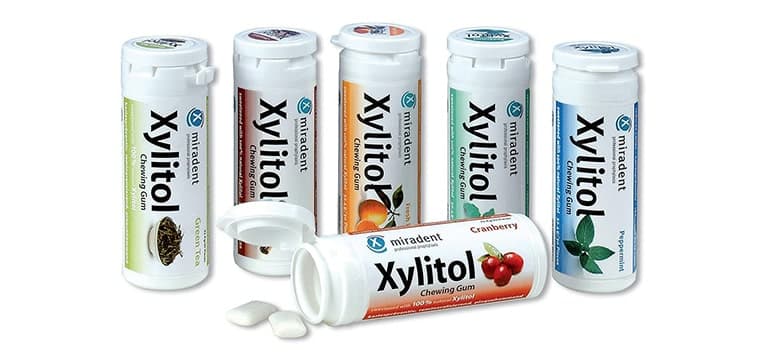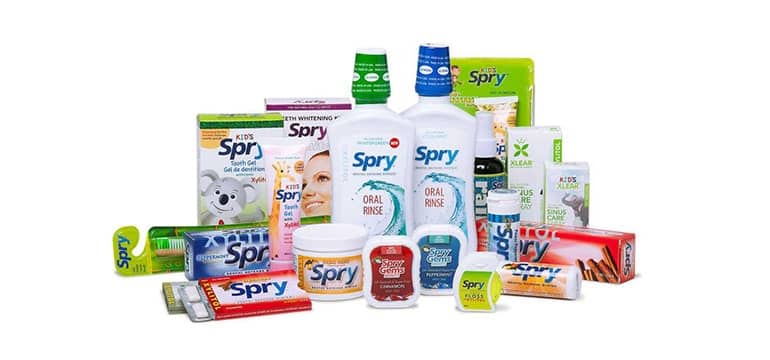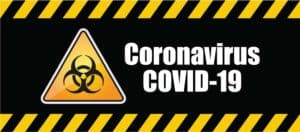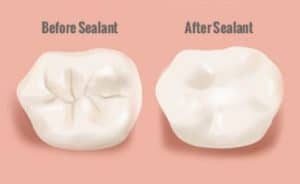The benefits of Xylitol have been featured in the news recently, but have you heard of this new wonder in dental supplements?
Studies show that dental caries (cavities) affect 60-90% of all schoolchildren and adults, making cavity prevention a major worldwide health concern.
Everyone knows that you should see your dentist twice per year to keep cavities from wreaking havoc on your teeth. However, Xylitol can also help to keep your teeth healthy and cavity-free.
The amazing substance has been shown to reduce your chances of developing cavities, and the good news is that you don’t need to see a dentist to receive the cavity-fighting effects.
The substance can be used at home whenever you want. Though you should still schedule your bi-yearly dental appointment if you haven’t already, just to be on the safe side.
As your local Green Bay dentist, Dr. Brusky is a big proponent of Xylitol and is constantly touting its benefits and use to his patients.
“Xylitol is a wonderful, all-natural sweetener that has a host of health benefits,” Dr. Brusky said. “It is a wonderful sugar substitute because it has a deliciously sweet taste, without the aftertaste many sugar substitutes have. Moreover, it has a host of dental benefits – including reducing tooth decay and plaque formation.”
Here is all you need to know about this amazing all-natural substance that is taking the dental industry by storm and helping patients everywhere maintain healthier teeth for life.
What is Xylitol & What is it Made From?
Xylitol is a rather unique substance that resembles a cross between a sugar and an alcohol but is actually neither. The substance is classified as a carbohydrate and can be found in many plants, fruits, and vegetables. Xylitol is heavily used in a variety of medicines for all sorts of conditions. Most commonly, pharmaceutical companies collect Xylitol from birchwood trees, though it can also be extracted from corn.
As far as substances go, Xylitol is one that offers more than meets the eye. In addition to fighting cavities, its use can:
Sweeten Your Foods and Drinks
Many people use Xylitol to sweeten foods and drinks they consume. As such, the substance can be considered an artificial sweetener on par with sucrose but with fewer calories. As a matter of fact, the substance contains 40% fewer calories than sugar, making it a favorite of those attempting to drop a few pounds.
Satiate Diabetics
Those with diabetes who are told to stay away from sugar can now have the sweetness they crave by adding Xylitol to their diets. Using the substance doesn’t cause blood sugar or insulin levels to fluctuate like sugar. This is due to the fact that the substance slowly absorbs into the body.
Help with Middle Ear Infections
Researchers have found that Xylitol can help with attacks of the middle ear (Otitis media) in young children who experience frequent earaches. While more research is needed into its efficacy, experts believe that Xylitol’s ability to fight bacteria is one reason it helps with troublesome ears.
Prevent Cavities
Of course, it is Xylitol’s ability to fight off bad bacteria that makes it so useful in dentistry, and why Dr. Brusky is such a big fan.
Why You Should Include Xylitol in Your Diet
Instead of reaching for the sugar the next time you sit down to eat, reach for the Xylitol instead. As a sugar-substitute, the substance is quite effective at making foods and drinks taste better. The FDA approved the substance as an artificial sweetener and companies everywhere are using it in a wide variety of products. The next time you go to the grocery store, look around and pay attention, and you will likely see baked goods, jellies, jams, syrups, chocolate products, cough syrups, vitamins, and OTC medications, all with Xylitol as a featured ingredient.
Xylitol tastes sweet, but it acts very differently when compared to sugar. When you eat sugar, your saliva converts the compounds to a series of acids that can begin to deteriorate the enamel that protects your teeth. Once that shield of protection is gone, the vital components that comprise your teeth become vulnerable, leading to tooth illness and eventually tooth loss.
Xylitol behaves differently. When you consume Xylitol, the compounds actually work with your saliva to protect enamel and fight off harmful bacteria.
How Does Xylitol Work on Teeth?
Your mouth has a relatively low pH level, meaning it is on the acidic side. After we eat and drink, the sugars in our meals are consumed by the bacteria in our mouths and converted into acid, beginning what is known as an acid attack on the teeth. This can last for up to 30 minutes following a meal or snack.
Xylitol raises the pH level in our mouths. The substance neutralizes the acid and stops an attack before it can begin.
Furthermore, Xylitol is non-fermentable, which means that bacteria cannot use the substance in their metabolic processes. The bacteria thus starve and are no longer able to thrive or produce their byproduct, which are those harmful acids that attack your teeth. In fact, using Xylitol products can reduce the level of acid-producing bacteria by as much as 90 percent.
Xylitol is also an anti-adhesive. By adding a protective barrier to teeth, the substance prohibits bacteria from sticking to the cell tissue. Because bacteria must adhere to tooth cells in order to thrive, Xylitol is able to reduce the effects that harmful bacteria usually cause (plaque and acids) without the use of harmful chemicals or drugs.
“Using products such as chewing gum or toothpaste that contain it can significantly reduce the risk of developing dental caries,” said Dr. Brusky. “Xylitol has even been shown to reverse small areas of dental decay currently present in a patient’s mouth. As a cosmetic dentist, I want my patients to have the most beautiful smiles possible, and it is a great tool to help protect their teeth.”
Is Xylitol Ever Bad for Your Teeth or Are There Any Side Effects?
Xylitol is approved by the FDA and has thus been found safe at low levels. In fact, experts recommend that you consume the substance several times per day for healthier teeth.
It has been found that adults can safely tolerate between 10 grams and 30 grams of Xylitol per day, which should be divided into smaller doses. Once the body adapts to Xylitol, adults can consume up to 70 grams per day without experiencing any side effects.
As far as children are concerned, some studies have used doses of up to 45 grams daily for kids experiencing earaches and other issues. However, speak with your dentist or doctor before using Xylitol in such high doses in your child.
So, as you can see, Xylitol is fairly safe. However, there have been some negative side effects reported. While harm to your teeth has never been shown, some people may develop bloating, gas, and diarrhea when taking the substance at higher levels.
Women who are pregnant or breast-feeding should also use caution, as not enough is known about the use of Xylitol during this stage of life.
It should be noted that Xylitol is toxic in dogs. So, while health conscious people may consider using this low-calorie sugar-substitute in their pet treats, doing so is not recommended. In fact, Xylitol should be stored high on a shelf, out of your dog’s reach.
Can You Brush Your Teeth with Xylitol Toothpaste?
Yes! It may seem counterproductive to brush your teeth with an artificial sweetener, but many people enjoy the dental benefits of Xylitol by brushing with the substance at least twice a day.
Dr. Brusky recommends that you use 6 to 8 grams of Xylitol at least once per day to protect your teeth against decay.
How Much Xylitol is in the Toothpaste?
In 2002, a researcher named Jannesson found that using a 10% Xylitol toothpaste for a period of six months effectively reduced levels of bacteria in test subjects’ saliva and plaque.
When deciding which toothpaste to use, you may get confused the next time you go looking for a brand at the supermarket. There are many brands on the market that claim to be the best, and they all have varying degrees of Xylitol content. Squigle Enamel Saver Toothpaste has 36% while Natural Dentist Healthy Teeth & Gums Toothpaste has 10%.
Experts advise you to “strive for five,” which means to ensure there are at least five grams of Xylitol in any toothpaste you use. But how does the percentage equate to grams, and how do you know which toothpaste is best?
How Xylitol is Measured, and Which is the Best Toothpaste?
Toothpaste companies label their products based on the amount of Xylitol “by weight.” For example, if you pick up a four-ounce tube of toothpaste that shows a 10% concentration, that product has .4 ounces of Xylitol, which amounts to about 11 grams. The question is how much are you being dosed with by brushing your teeth with the paste once or twice a day?
The amount you are actually getting from your toothpaste isn’t so easy to figure out.
The higher the concentration, the more you are likely to receive. To help you out, here are a few brands of toothpastes along with their Xylitol content percentage. As long as Xylitol is listed as one of the primary ingredients, you should be able to reap the tooth-health benefits of Xylitol without any pesky side effects.
Best Xylitol Toothpaste Brands on the Market
- Squigle Enamel Saver Toothpaste – 36%
- Epic Fluoride and Xylitol Toothpaste – 31%
- NOW Xyliwhite Toothpaste (Gel) – 25%
- Xlear Spry Cinnamon Toothpaste (with fluoride) – 25%
- Natural Dentist Healthy Teeth & Gums Toothpaste – 10%
There are many Xylitol toothpastes on the market. The type you get doesn’t much matter as much, as long as there is enough of the substance in the brand to warrant its regular use. When selecting a toothpaste with the cavity-fighting carb, look for brands where Xylitol is mentioned as the first ingredient, or at least one of the first.
Are There Xylitol Toothpaste Side Effects?
There shouldn’t be any side effects with such low levels of Xylitol. Brushing a couple of times per day should not raise the levels in your body too much.
The recommended amount to use for cavity prevention is 15 grams per day by the World Health Organization. As long as you stick to those levels, you should be able to prevent any negative side effects from regular Xylitol use.
Ask About Xylitol at Your Next Appointment
Green Bay dentist Dr. Brusky looks forward to seeing you in the dental chair so that he can tell you all about the amazing benefits of Xylitol. While nothing beats a thorough cleaning and dental prevention using the latest dental tests and procedures, Xylitol can help with regards to self-care.
Dr. Brusky can help you devise a self-care routine for a beautiful and healthy mouth. Any effective routine will include the usual brushing twice a day and flossing, but there is more you can do. One of those extra tasks is to fortify your daily dental routine with Xylitol. You don’t have to use toothpaste, but it helps. At the very least, you might want to try a gum or candy. That way, you can keep bacteria at bay by using Xylitol in addition to seeing your dentist twice per year.
And if your bi-yearly appointment is coming up, make sure you call to schedule with Green Bay’s favorite dentist, Dr. Brusky. Call the Center for Dental Excellence now to secure your spot for the best dental services in town. All of us here, including the doctor and staff, look forward to seeing you at your next appointment.








